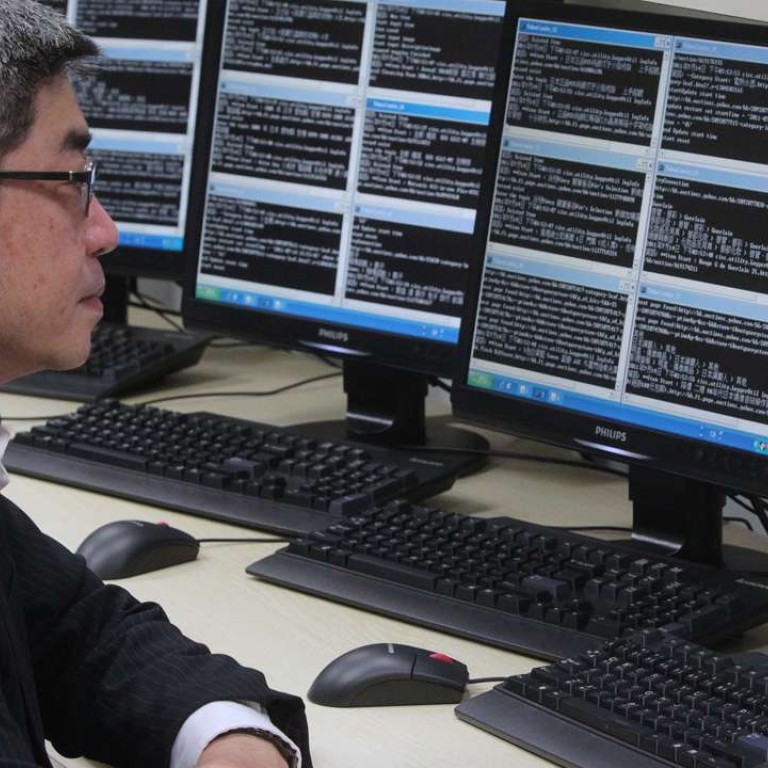
New | Alibaba’s bot the latest weapon in China’s fight against bootleggers
Alibaba ratchets up anti-counterfeiting plan even as US names Taobao as a ‘notorious market’ - Zhejiang’s Operation Cloud Sword has helped send 800 counterfeiters to jail in past 12 months
Alibaba Group Holdings, operator of the world’s largest online shopping platforms, said it was using big-data analytics to help Chinese law enforcement crack down on counterfeit products on its Taobao Marketplace site, even as the United States government included it in an annual “notorious markets” list.
Powered by big data, Alibaba’s bot programme could scan product listings and analyse online transactions on its Taobao, Tmall and Juhuasuan platforms. The 600 analytics models of this bot could process 100 million pieces of data per second, providing scans on more than 10 million product listings a day, Alibaba said.
That online intelligence had been vital in helping Chinese law enforcement officials seize 1.43 billion yuan (HK$1.6 billion) of bootleg goods, said Alibaba, owner of the South China Morning Post.
“More than 800 counterfeiters were sent to jail in the past year due to these efforts and the big data analysis of Alibaba’s anti-counterfeit campaign,” Alibaba chief executive Daniel Zhang Yong said in a memo to company staff yesterday.
China, the world’s factory with facilities ranging from mega factories to backyard workshops, has been fighting a long and arduous battle to crack down on counterfeiters and their copycat watches and bags, ever since the country became a member of the World Trade Organisation.
Alibaba, whose three main shopping sites had a combined 423 million active buyers - equal to the populations of the US and Mexico - in the 12 months to March 31, finds itself as a vanguard of the battle, as its platforms at times copped the blame for bootlegs.

Among the offenders identified by the USTR are Taobao, BeeVideo, GongChang and Nanjing Imperiosus Technology.
Alibaba’s president Michael Evans said the company was “very disappointed by the USTR’s decision, which ignores the real work Alibaba has done against counterfeiters”.
“We remain fully committed to protecting the intellectual property of rights holders, both through significant proactive measures and working with brand owners, to combat counterfeiting online and offline,” Evans said.
Alibaba runs three major Chinese online shopping marketplaces: consumer-to-consumer platform Taobao, business-to-consumer site Tmall and group buying platform Juhuasuanm with US$485 billion in combined gross merchandise volume in the 12 months to March 31.
Its November 11 Singles Day online shopping gala this year generated a record US$17 billion of gross merchandise volume in 24 hours, far larger than the traditional Black Friday and Cyber Monday sales in the US and Britain.
The USTR, the agency that develops trade policy for the US president, has identified notorious markets in its Special 301 report since 2006. In 2010, the Obama administration announced that it would increase public awareness of the Notorious Markets List by publishing it separately from the Special 301 report.
Froman said the latest list “takes stock of emerging infringement models, and adds stream-ripping sites and piracy apps to the list of the most damaging digital marketplaces”.

“In 2016 alone, we proactively removed more than double the number of infringing product listings than in 2015,” Evans said. “It is, therefore, unreasonable for the USTR to have concluded that Alibaba is less effective in anti-counterfeiting than when it reviewed our efforts in 2015, and when it removed us from its list four years ago.”
“The more than 100,000 brands that operate on Alibaba’s marketplaces cannot all be wrong,” Evans said.
He pointed out that Alibaba has “dedicated far more personnel, financial resources and advanced technologies toward protecting intellectual property than any other e-commerce company”.
Big data refers to the vast quantities of unstructured information generated from digital sources, which are analysed using high-performance computer systems to gain insight into customers, trends and business activities.
For the second consecutive year, Alibaba has used its big data capabilities to support “Operation Cloud Sword” - a joint effort against counterfeiting led by the Zhejiang province Public Security Bureau, in co-ordination with the Department of Industry and Commerce as well as the Quality Supervision Bureau.
The operation, conducted from April to July this year, cracked down on 417 counterfeit production operations and storage facilities across 12 provinces and municipalities on the mainland.
Zhang said: “All of our efforts are for the fairness of the Taobao marketplace, and for the 400 million consumers who like us, and use our service, not for any particular list.”
According to Alibaba, it is now working to establish a “Cloud Sword Alliance” to extend its anti-counterfeiting big-data initiative with law-enforcement authorities in Shanghai and the provinces of Anhui, Jiangxi and Jiangsu.

